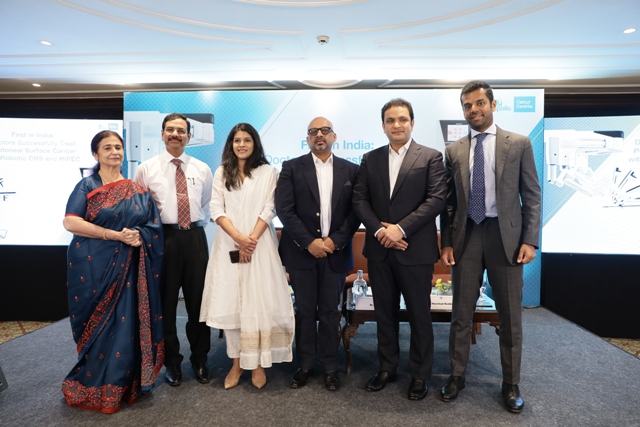9, May 2024
Hope in Motion: Doctors Successfully Perform India’s First Robotic CRS with HIPEC for Peritoneal Surface Cancer

Chennai, – May 9th, 2024 – In a major medical breakthrough, surgical oncologists at Apollo Cancer Centre (ACC) has successfully performed India’s first Robotic Cytoreductive Surgery (CRS) with Hyperthermic Intraperitoneal Chemotherapy (HIPEC) for a peritoneal surface cancer. This minimally invasive, robotic-assisted approach marks a paradigm shift in treating Pseudomyxoma Peritonei (PMP), an aggressive appendix cancer, offering patients with a new standard of care, enabling faster recovery and improved quality of life.
Benefits of Robotic CRS with HIPEC
• Smaller incisions resulting in less chance of wound infections, minimal scarring and better cosmesis
• Reduced tissue trauma allowing for a quicker return of bowel function, minimal blood loss and shorter hospital stay
• The robotic system utilizes magnification to enable surgeons to precisely locate even the smallest tumor implants for removal
• Less post-operative pain, potentially reducing the need for pain medications
• Faster recovery allowing patients to resume normal routine at the earliest
Dr. Ajit Pai, Senior Consultant in Surgical Oncology and Robotic Surgery, Apollo Cancer Centre, Chennai along with his team, spearheaded this first-of-its-kind approach. The collaborative clinical expertise and unwavering dedication to transformative tech innovations at ACC, were instrumental in achieving this remarkable success.
A female patient, aged 51, was diagnosed with bilateral ovarian masses, and had extensive surgical intervention, including the removal of the uterus, ovaries, appendix, and part of the omentum. Subsequent histopathological examination revealed a high-grade mucinous tumour of the appendix with pseudomyxoma peritonei (PMP), necessitating additional surgery. The patient was found to have residual mucinous implants (gelatinous deposits that remain in the abdomen post-surgery for appendicular mucinous tumors) in the pelvis and around the cecum (first part of the colon).
Due to the peculiar tendency of the appendix cancer to spread to the lining of the patient’s abdomen (peritoneum), Dr Ajit Pai and team performed minimally invasive Robotic Cytoreductive Surgery (to reduce the amount of cancer cells in the abdominal cavity) with right hemicolectomy (removing the colon which bears the appendix) and complete mesocolic excision (surgery for treating cancer arising from the colon and appendix) and peritonectomy and total omentectomy, along with Hyperthermic intraperitoneal chemotherapy (heated chemotherapy with a chemo drug) eliminating any possible microscopic residual tumours inside the abdomen.
Traditionally, CRS/HIPEC has been performed as an open and an extensive operation, with a 10-12-inch incision associated with prolonged hospitalization. The Robotic CRS approach offers significant advantages as it is minimally invasive; the clinicians made use of tiny 8mm incisions for the robotic instruments, minimizing pain, blood loss, scarring and discomfort. Additionally, a single 5cm incision was used for tumour removal and the delivery of HIPEC. This novel approach translated to a faster recovery and a quicker return to normal life for the patient. At one year follow up, she remains in perfect health and cancer free.
Dr. Ajit Pai, Senior Consultant in Surgical Oncology and Robotic Surgery, Apollo Cancer Centre, said, “Robotic CRS offers a transformative approach, requiring expertise in traditional and robotic techniques for precise tumor resections. With reduced post-operative morbidity, minimal access, and quicker recovery, this method is a viable choice for patients whose cancer cells have spread to and implanted on the peritoneal surfaces in a limited manner. We are thrilled with the successful clinical outcome and the potential this approach holds for improving the lives of patients battling peritoneal surface cancers, including those from ovarian, colonic and gastric malignancies.”
Cancer winner Subarna (name changed), said, “Words cannot express my gratitude to the entire team of doctors who took care of me. This pioneering robotic approach offered hope, with faster recovery. Thanks to this innovation, I returned home sooner than expected, feeling completely normal after treatment, with a renewed sense of optimism. I am incredibly thankful to Apollo Cancer Centre for offering this life transforming procedure.”
Dr. Preetha Reddy, Executive Vice Chairperson, Apollo Hospitals Enterprises Ltd, said, ” At ACC, we understand that cutting-edge technology is just one piece of the puzzle. While we invest in the most advanced technologies available, it’s our exceptional team of clinicians who truly unlock the potential of unparalleled clinical excellence. This powerful synergy between technology, innovation and clinical expertise sets Apollo apart, enabling millions across the world to Win Over Cancer”.
Mr. Dinesh Madhavan, President Group Oncology and International, Apollo Hospitals Enterprises Ltd, said, “Robotics is revolutionizing cancer care, offering unparalleled precision and minimal invasiveness. At ACC, we leverage this technology to enhance treatment outcomes, reduce recovery times, and provide our patients with the most advanced therapies available today. This is India’s first novel approach (robotic CRS and HIPEC) by our exceptional clinical team for treating peritoneal surface cancers is yet another testament to our unwavering commitment in providing patients with the best-in-class treatment.”
The estimated incidence of pseudomyxoma peritonei is approximately 1 to 4 out of a million, annually. Patients have an average age of 53 years at the time of diagnosis. Recognizing the aggressive nature and occurrence of this type of appendix cancer, particularly more in women, Apollo Cancer Centre continues to push boundaries and innovate to provide the best possible care to those battling these complex cancers.
- 0
- By Rabindra







